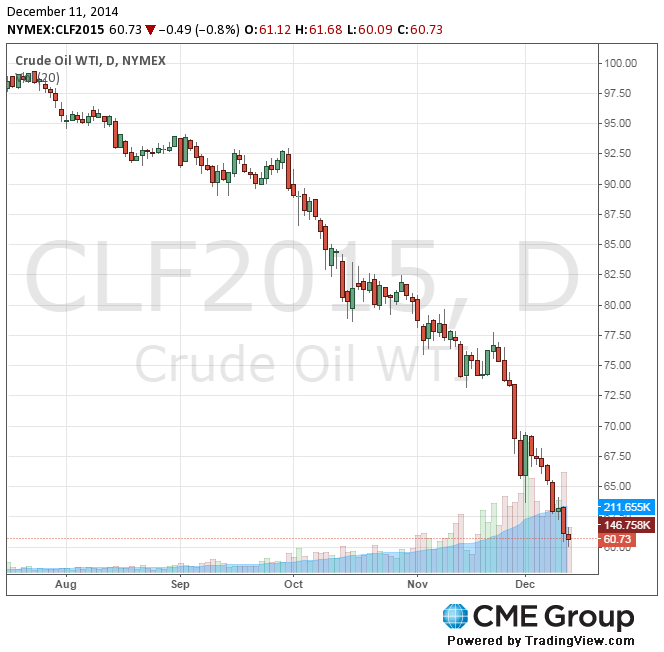Notícias do Mercado
-
23:38
Commodities. Daily history for Dec 11’2014:
(raw materials / closing price /% change)
Light Crude 59.26 -1.15%
Gold 1,227.70 +0.17%
-
16:40
WTI fell to the lowest level since July 2009
West Texas Intermediate crude fell to the lowest level since July 2009 as Saudi Arabia questioned the need to cut output, bolstering speculation that OPEC's biggest producer will defend market share.
Futures fell as much as 1.4 percent in New York while Brent slipped 0.8 percent. The market will correct itself, according to Saudi Arabian Oil Minister Ali Al-Naimi. Global demand for crude from the Organization of Petroleum Exporting Countries will drop next year by about 300,000 barrels a day to 28.9 million, the least since 2003, the group predicted yesterday.
Oil's collapse into a bear market has been exacerbated as OPEC's three largest members offered the deepest discounts on exports to Asia in at least six years. The group decided against reducing its output quota at a meeting last month, letting prices drop to a level that may slow U.S. production that's surged to the highest level in more than three decades.
"The market is in free fall," Stephen Schork, president of Schork Group Inc., a consulting group in Villanova, Pennsylvania, said by phone. "Prices will continue to fall until the Saudis signal that they are prepared to take action or we see the global economy pick up."
WTI for January delivery fell 27 cents, or 0.4 percent, to $60.67 a barrel at 10:02 a.m. on the New York Mercantile Exchange. Futures touched $60.09, the lowest since July 15, 2009. Total volume was 34 percent above the 100-day average for the time of day. The U.S. benchmark is down 38 percent this year.
Brent for January settlement slipped 11 cents to $64.13 a barrel on the London-based ICE Futures Europe exchange. Volume was 6.4 percent higher than the 100-day average. The North Sea crude traded at a $3.46 premium to WTI. Prices are down 42 percent in 2014.

-
11:22
Oil: Prices recover slightly and edge up close to USD65 a barrel
Brent crude and West Texas Intermediate recovered from five-year lows helped by a weaker U.S. dollar. Brent Crude added +0.98% trading at USD64.87 a barrel, and West Texas Intermediate gained +0.80% currently quoted at USD61.43. Oil prices were under further pressure after comments from Saudi Oil Minister Ali al-Naimi on Wednesday that he sees no reason why Saudi Arabia should trim output rates and that the oil price is going to balance itself. Other OPEC members are evaluating whether to call for an emergency meeting early next year or not.
Yesterday Kuwait offered the biggest discount to its Asian customers since December 2008, following Saudi Arabia and Iraq and the OPEC published data showing that demand for its crude will fall to its lowest in 2015 in more than ten years.
-
11:00
Gold prices decline – back at USD1220
Gold prices fell for a second day pulling back from Tuesday's strong gains currently quoted at USD1,220.70 or -0,38% a troy ounce as equity markets rebounded and concerns over political instability in Greece and restrictions on China's debt markets were shrugged off. As the ECB's second round of TLTRO was well accepted expectations for a quantitative easing lowered. Markets await key U.S. data on retail sales and initial jobless claims later in the session at 13:30 GMT.
Despite recent gains the metal is likely to remain vulnerable in the short term amid signs that the strengthening of the US economic recovery may prompt the Federal Reserve to start raising interest rates sooner than expected.
GOLD currently trading at USD1,226.30
-
